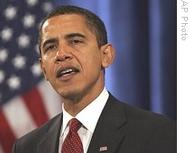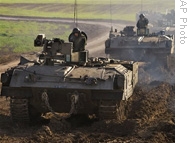-
(单词翻译:双击或拖选)
 |
| President-elect Barack Obama (file photo) |
Israel's decision to launch a massive military assault on the Gaza Strip in an effort to end Hamas rocket attacks on civilians7 in the Jewish state is a crisis that is not likely to be resolved when Barack Obama is sworn in as president in less than two weeks.
Martin Indyk, a Middle East expert who served two tours as U.S. Ambassador to Israel, says the deadly fighting will require the new president's immediate8 attention.
"His first challenge, depending on what exactly the situation is going to be like on January 20, is to achieve a sustainable cease-fire. I think the diplomatic efforts that are beginning now to get a cease-fire may well have borne fruit by January 20th. But my own experience in the Middle East is that everything takes a lot longer than one expects," he said.
 |
| A Palestinian boy stands next to destroyed houses after an Israeli missile strike in the Rafah refugee camp, southern Gaza Strip, 01 Jan. 2009 |
Indyk says it is important for the new president and Secretary of State-designate Hillary Clinton to launch a diplomatic initiative immediately following a cease-fire to try to move forward a political process of reconciliation9 between Israel and the Palestinians.
Israel ended its 38-year military occupation of Gaza in 2005 and says it has no intention of permanently10 reoccupying the narrow coastal11 strip along the Mediterranean12 with a population of about 1.5 million people.
Hamas took military control of Gaza in 2007 from rival Fatah forces leading Israel to clamp tight restrictions13 on the border in an attempt to end rocket attacks from the militant3 group, which in its founding charter calls for Israel's destruction.
Danny Gillerman, a former Israeli ambassador to the United Nations, says his country's goals are clear.
"Our aims are to dramatically change the security situation in the south to put an end to rocket firing - to put an end to terror, to put an end to smuggling14 and to put an end to the rearming of Hamas," he said.
Analysts say the Obama administration's policies on the Middle East must recognize how the Israeli-Palestinian conflict is intertwined with other challenges in the region.
"One of the great mistakes that we have made most particularly over the course of the last eight years has been to believe that we can compartmentalize these different policies - that we can somehow separate what is happening between Israel and the Palestinians from what is happening in Iraq, what is happening with Iran and what is happening in Egypt and Saudi Arabia and everywhere else in the Middle East. The truth is that all of these things are deeply interconnected," said Kenneth Pollack, a former Middle East analyst1 at the U.S. Central Intelligence Agency and now a Senior Fellow at the Washington-based Brookings Institution.
 |
| Israeli Armored Personal Carriers drive to the Gaza Strip, near border with Gaza, southern Israel, 07 Jan 2009 |
Tamara Cofman Wittes, who directs the Middle East Democracy and Development Project at the Saban Center for Middle East Policy also at the Brookings Institution, says Israel's military offensive carries numerous risks for the Israeli government and she predicts that officials will be looking for a way to end the conflict before the new U.S. president is sworn into office.
"If this ground operation drags on from now through January 20th, my suspicion is that the strategic gains for Israel are going to taper15 off quite sharply in this operation," she said. "By then, they will be looking hard for a way to climb down from their tree [and end the offensive]."
Shibley Telhami, the Anwar Sadat Professor for Peace and Development at the University of Maryland, says Barack Obama must be careful not to let the crisis in Gaza define his administration's policy toward the region.
"I think if you say something about this crisis as your very first thing, you do not have a second chance to make a first impression, then you really are tying your hands in a way that is consequential16. I think it is a mistake, a big mistake for him to intervene in this crisis. As much as many of us want to see some nuanced policy on the Arab-Israeli issue, but this is not the time for him to intervene," he said.
Telhami says that while the fighting in Gaza is very serious, it remains17 only a small part of the overall Arab-Israeli conflict. He says that soon after Mr. Obama becomes president, he should make a comprehensive statement on the Middle East.
Mr. Obama has promised to hit the ground running on renewed efforts to achieve a broad peace agreement shortly after January 20.
 收听单词发音
收听单词发音
1
analyst

|
|
| n.分析家,化验员;心理分析学家 | |
参考例句: |
|
|
|
2
analysts

|
|
| 分析家,化验员( analyst的名词复数 ) | |
参考例句: |
|
|
|
3
militant

|
|
| adj.激进的,好斗的;n.激进分子,斗士 | |
参考例句: |
|
|
|
4
militants

|
|
| 激进分子,好斗分子( militant的名词复数 ) | |
参考例句: |
|
|
|
5
attaining

|
|
| (通常经过努力)实现( attain的现在分词 ); 达到; 获得; 达到(某年龄、水平、状况) | |
参考例句: |
|
|
|
6
lasting

|
|
| adj.永久的,永恒的;vbl.持续,维持 | |
参考例句: |
|
|
|
7
civilians

|
|
| 平民,百姓( civilian的名词复数 ); 老百姓 | |
参考例句: |
|
|
|
8
immediate

|
|
| adj.立即的;直接的,最接近的;紧靠的 | |
参考例句: |
|
|
|
9
reconciliation

|
|
| n.和解,和谐,一致 | |
参考例句: |
|
|
|
10
permanently

|
|
| adv.永恒地,永久地,固定不变地 | |
参考例句: |
|
|
|
11
coastal

|
|
| adj.海岸的,沿海的,沿岸的 | |
参考例句: |
|
|
|
12
Mediterranean

|
|
| adj.地中海的;地中海沿岸的 | |
参考例句: |
|
|
|
13
restrictions

|
|
| 约束( restriction的名词复数 ); 管制; 制约因素; 带限制性的条件(或规则) | |
参考例句: |
|
|
|
14
smuggling

|
|
| n.走私 | |
参考例句: |
|
|
|
15
taper

|
|
| n.小蜡烛,尖细,渐弱;adj.尖细的;v.逐渐变小 | |
参考例句: |
|
|
|
16
consequential

|
|
| adj.作为结果的,间接的;重要的 | |
参考例句: |
|
|
|
17
remains

|
|
| n.剩余物,残留物;遗体,遗迹 | |
参考例句: |
|
|
|















